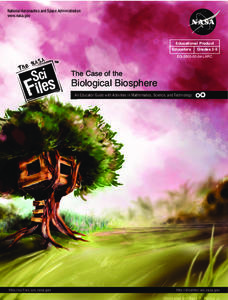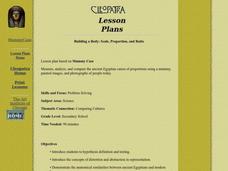Baylor College
Drugs, Risks and the Nervous System
In cooperative groups, middle schoolers contemplate the probability of 18 different situations occurring. After they make predictions, they compare them to the actual risk factors. This eye-opening exercise demonstrates that the odds of...
Baylor College
Pre-Assessment: The Brain
Break your class in to the general structure and function of the brain. Brainiacs discuss what they know about it and create personalized brain development timelines. They also take a true-false, pre-assessment quiz to get them thinking...
Curated OER
Body
In this body worksheet, students will practice labeling the different parts of the body. Students will study ten photographs and match each picture with the correctly named body part.
Curated OER
The Case of the Biological Biosphere: Health, Math, Technology
Students investigate various aspects of the human body in this imaginative Tree House Detective episode about the biological biosphere. In a series of They take measurements, analyze data, and use technology. The lessons revolve around...
Baylor College
Digestion
Digestion is an amazing and complicated process that provides humans with the energy they need to survive. Lesson six in this series on the science of food uses sliced turkey and a meat tenderizer to demonstrate how enzymes help break...
Baylor College
How Much Water Do Humans Need?
Physical or life science learners measure the amounts of water eliminated by intestines and the urinary system, and the amounts lost via respiration and perspiration. In doing so, they discover that the body's water must be replenished...
Baylor College
Food for the Brain
With a couple of neat diagrams on student handouts, your life science or health class will examine the contents and serving sizes of healthy foods. They dissect a slice of pizza and scrutinize the nutritional value of its components in...
Curated OER
Learning About Animals' Bodies
Students research different animals (mammals, reptiles, amphibians, insects, birds, fish) and create books, murals, dioramas, puppets, and sculptures to illustrate the necessity of various body parts for overall survival. In this animal...
DiscoverE
Human Suspension Bridge
When is it okay to be suspended in school? When you're part of a human suspension bridge! Learners first model tension and compression in pairs. Once complete, they get together as a class to model a suspension bridge.
Baylor College
Breathing Machine
Take a deep breath and have your class construct working models of a lung! Using 500ml plastic bottles as the chest cavity, and balloons for the lung and the diaphragm, learners work in groups to make a model. The models help them to...
Curated OER
Sizing Up the Supersize Croc
Young scholars examine and compare traits of humans and crocodiles. In this crocodile lesson plan students use a ratio to estimate the height of a person and compare that to a crocodile.
Baylor College
Neurotransmitters Contain Chemicals
Human body systems students play a card game, "Locks & Keys" in order to learn that neurotransmitters carry a message from one neuron to another by fitting into a receptor site on the receiving nerve cell. While this activity can...
Baylor College
Neural Network Signals
Using a simple circuit with the battery representing the brain, future physiologists test to see which solutions conduct electrical "nerve impulses." Enlighten learners with plentiful information on electric signals in the nervous system...
Scholastic
Study Jams! The Immune System
A set of slides depicts sick children, an artistic rendition of a white blood cell amongst red blood cells, and a diagram of part of the lymph system to teach youngsters about immunity. Kids will find that it is made up of skin, white...
Curated OER
Integumentary System: A System, An Organ, the Biggest!
It is only six short slides, but an acceptable outline of the integumentary system. General facts about the system, layers, sublayers, and functions are listed as bullet-points. What would make this presentation more engaging for your...
Baylor College
What Is a Neuron?
Your class won't get on your nerves while doing this modeling activity! After teaching the structure and function of a neuron using the included diagrams, give individuals some clay and chenille stems so that they can make their own...
Baylor College
Heart and Lungs
With a partner, youngsters measure their pulse and breathing rates, both at rest and after running in place for a minute. While this activity is not novel, the lesson plan includes a large-scale classroom graphing activity and other...
Messenger Education
Exploring Exploring
The reason people first began trading was because of their desires for objects other societies possessed. In the activity, classes discuss why exploration has been a common thread in all societies and where these desires have taken...
Baylor College
Post-Assessment: Brain Chemistry
If you have implemented this fabulous brain chemistry unit in its entirety, you should have saved the pre-assessment quizzes from day one. In this assignment, individual learners go back over their original answers, and correct any...
Curated OER
Physical Adaptations in Ice Age Mammals
Students identify the body parts in Ice Age mammals that allowed them to survive. They answer questions as a class and discuss. They examine photographs of the animals as well.
University of Northern Iowa
Clothing
As part of an investigation of the folk traditions of their area, class members research the articles of clothing worn at earlier times, the fibers and materials, and the machinery used to produce these items. In addition, class members...
Curated OER
Building a Body: Scale, Proportion, and Ratio
Students measure, analyze, and compare the ancient Egyptian canon of proportions using a mummy, painted images, and photographs of people today.
Curated OER
Catch a Wave. . .
Part of a larger online space science website, this page has a brief explanation of electromagnetic radiation and a chart of wavelengths as compared to common objects. There are four questions to answer about the information. This can be...
Curated OER
Starfish
Students explore the concept of starfish. In this starfish lesson, students identify the parts of a starfish and how their body works. Students create a starfish using paint and a cornmeal mixture. They then glue on Cheerios to...

























